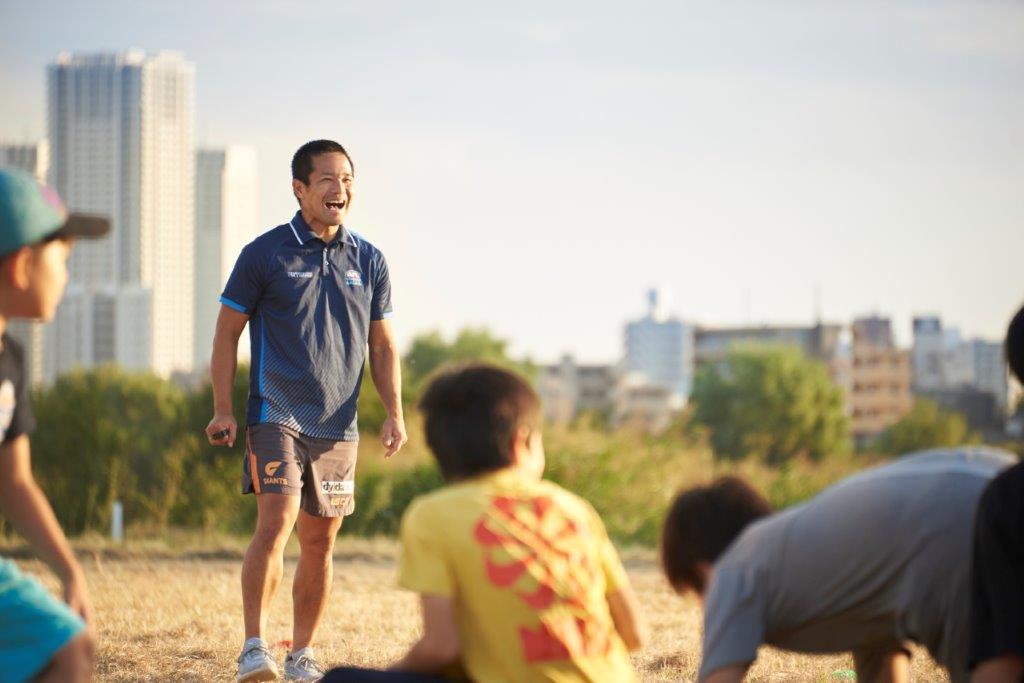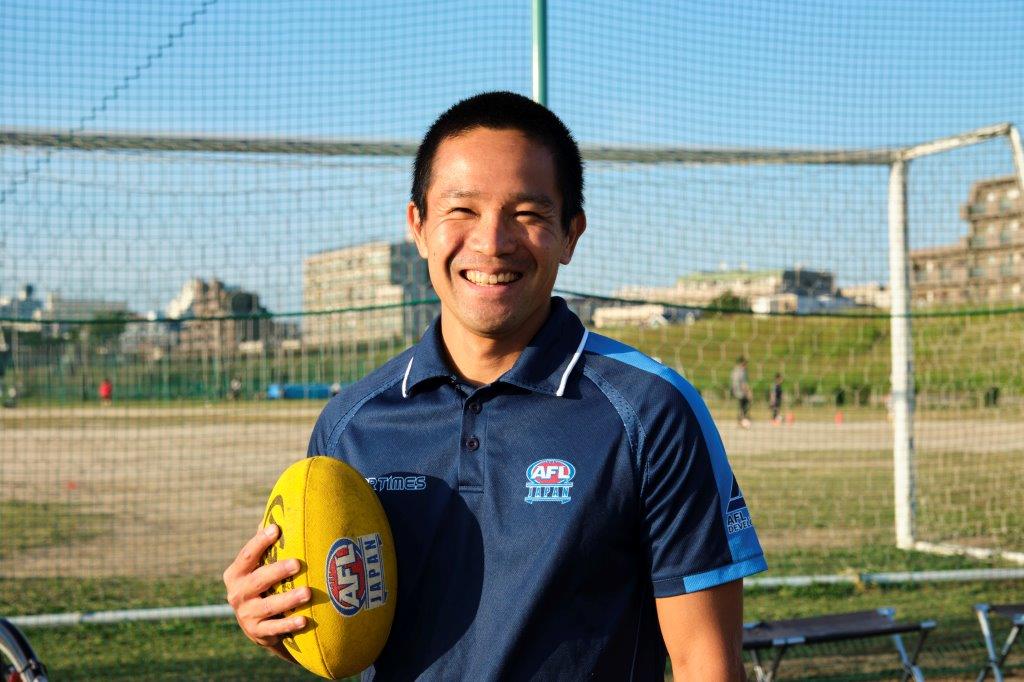
Have you ever heard of Australian Rules Football, or AFL? This uniquely Australian sport is not quite soccer and not quite rugby but has its own professional league down under. With his experience in Australia as a semi-professional, Michito Sakaki now works with AFL Japan to foster the next generation of players. Michito talked to us about his dream of giving rise to the first Japanese player in a professional AFL team and what he learnt playing the sport.
I try to spread the word about AFL while staying active as a player
Q: Michito, you still play AFL while pursuing other activities, right? Can you tell me about this?
A: I oversee outreach and development at AFL Japan, which means I mainly train players and give presentations about technique to members. I first encountered AFL when I was at Waseda University, and after I graduated, I spent 2006 to 2007 in Australia playing in an independent league.
After that, I came back to Japan in 2008, where I really began working to spread the word about AFL as part of an organisation that preceded AFL Japan. I’m still playing now, but I also work to convey how great AFL is through hands-on events and lectures.
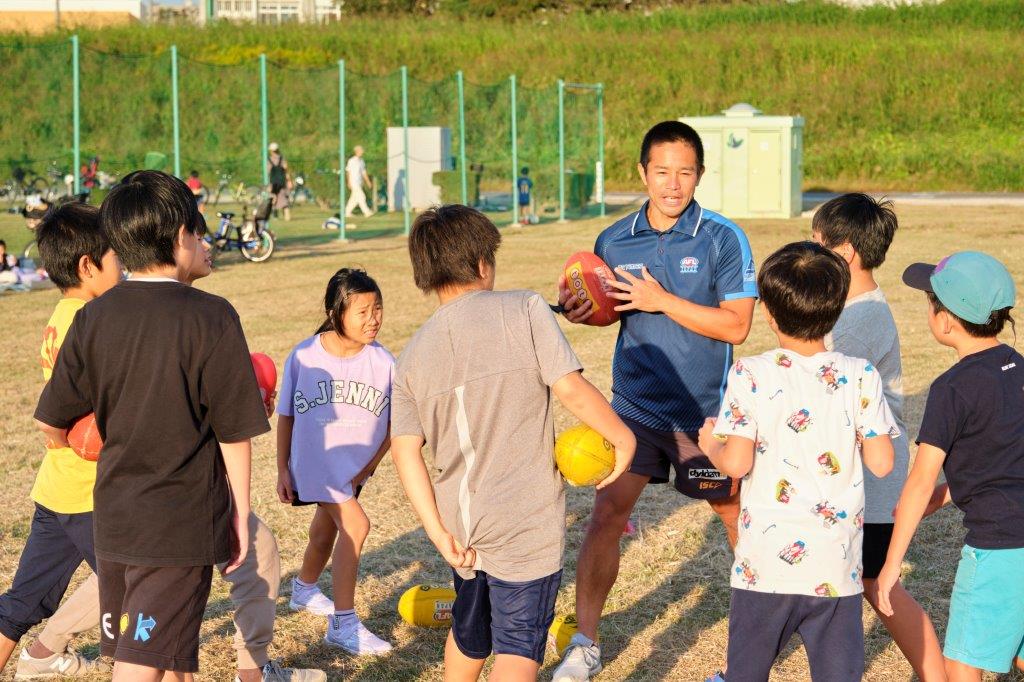
Michito now runs AFL classes for kids.
Q: Can you please tell us what sort of sport AFL is?
A: AFL is a unique sport that developed in Australia and is something like a cross between soccer and rugby. It is played with an oval ball on an oval ground, with each team comprised of 18 players for a total of 36 players on the field. It’s a very physical game and a great spectacle to watch. There are many positions, such as forwards, midfielders and defence, so even shorter players can find their niche role. In Australia, the sport is often referred to as ‘footy’ or ‘Aussie rules’ and is one of the most popular sports in the country.
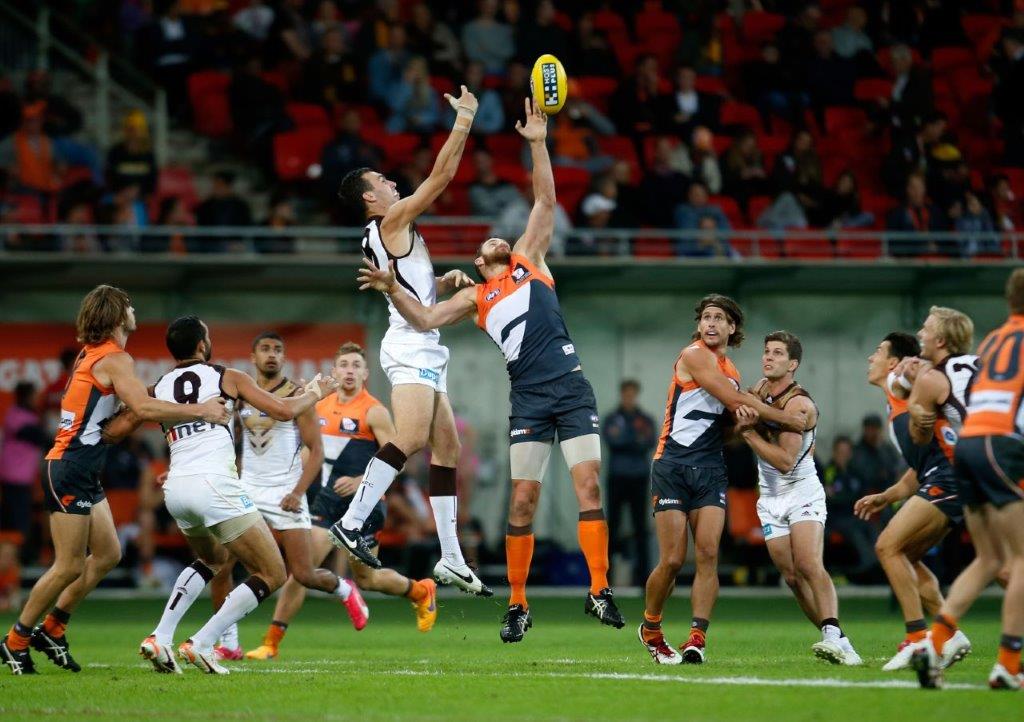
36 players jostle to make for a great spectacle
There is no offside rule as there is in soccer, so you can move the ball into enemy territory by hand passing or kicking it. There are four goalposts at each end of the ground, and if you manage to kick the ball in between the middle posts, you get six points. Getting the ball between the outer posts is called a ‘behind’, which is worth 1 point. A game is made up of four twenty-minute quarters, with the team with the highest score winning.
It is said that the game originated when players of the sport cricket – which is originally from the United Kingdom – began playing the game as a form of training in the winter off season. To this day, AFL is still played across Australia during winter and there are many people who play both cricket and AFL, similar to what we call “grass baseball” here in Japan.

AFL is played on an Oval field.
There is a league here in Japan – teams even played at the international level
Q: What triggered the growth of AFL here in Japan?
A: AFL first came to Japan’s shores in 1986. Fuji TV brought two very popular teams - the Hawthorn Hawks and the Carlton Blues to play a match in front of 25,000 people at Yokohama Stadium. It went so well that they decided to do it again the following year, with a curtain-raiser match between students from Keio University and Waseda University. That triggered the advent of AFL clubs at universities across Japan, so by the 2000s, there was an inter-university league. That was around the time that I played in the Waseda University team.
Subsequently, an all-Japan league was set up; at one time, we even had teams competing at international tournaments. Now, we have five teams in the Kanto region and one club in the Kansai region, for a total of six teams and around 180 players across Japan. There is a league, with two matches per month, and the grand final was held in December 2023.
Q: How do players today start their involvement with AFL?
A: When it comes to the kids that come to my clinic, many want to get involved with exercise but feel like they aren’t that good at sport. You see, if you want to get into soccer in Japan, you’ll get some very detailed training from coaches. So, kids who just want to knock about with a ball get left behind.
But AFL is a much freer type of sport, so it's perfect for kids who just want to be active. In some ways, it's like soccer but you can use your hands. There is no tackling under kids' rules, so it’s safe. I’ve got training from the AFL as a coach, but their way of training says that it’s nonsense to force kids to do things a specific way at that age. We just let them have fun, basically. If you go to any Japanese soccer club and take a look at how exacting they are about training people how to control the ball, you’ll notice the difference with Australia immediately.
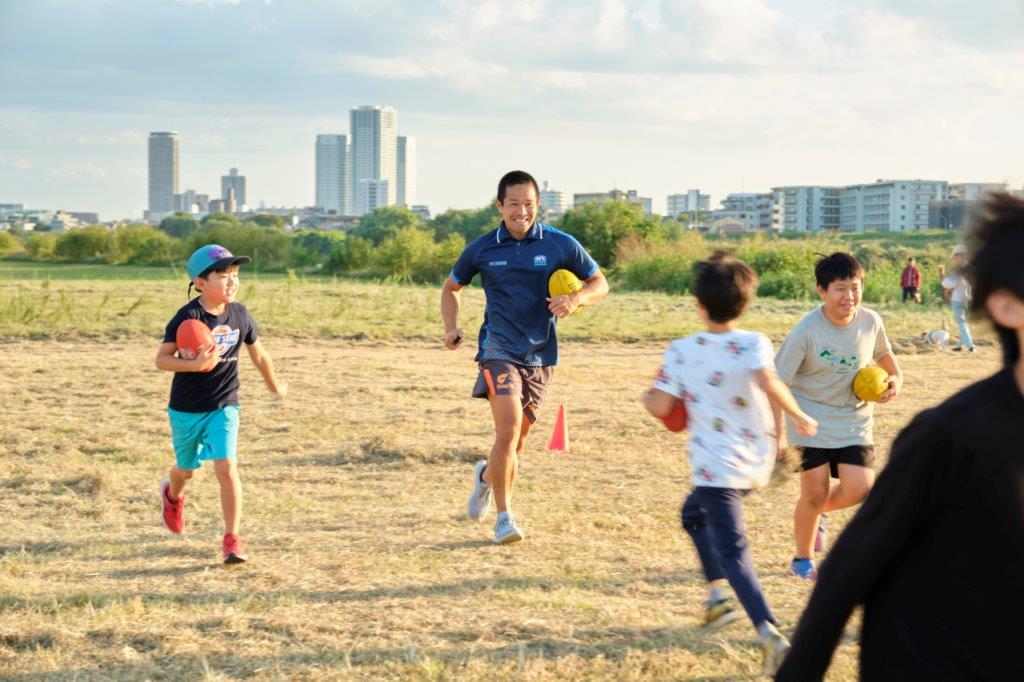
Australia is a sports-crazy nation, so it's the kind of place where you can still enjoy sport even if you’re not that good at it – and I mean that in a good way. Here in Japan, setting aside individual sports like swimming or jogging, there is a sense that it is hard to get involved in a team sport if you don’t have natural talent in that sport. In that sense, kids aren’t divided into the talented kids and those who are struggling in Australia. Being able to get out and exercise is seen as a right for everyone, even for those who aren’t that good at sport. This all might be a bit off topic, but I really feel that one of the best things about AFL is that anyone can get involved.
I was surprised that such a sport existed!
Q: So, you first encountered AFL during your university days. Can you please tell us more?
A: I first heard about AFL when I entered Waseda University, and I was encouraged to join their AFL club. It was then that I first saw footage of an AFL match – I still remember being surprised that such a sport existed! I’d never even heard of it before and was enchanted by how free it was and how many options the game has. I really had to give it a try.

AFL is a national game that every Australian knows about
Throughout primary school and junior high I did soccer. During high school, I was on the rowing team and went to the high school nationals. My three years at high school were all about sport, so I wanted to enjoy campus life once I went to university. But as soon as I saw that footage of AFL with the Aussie fans cheering their hearts out, I guess I felt how small my own world had been. Here I had found a whole new exciting sport!
After high school I got a part-time job for a while, but I didn’t find it satisfying. I realised I wanted to do sport. I felt like there was real potential in AFL as it is a sport where everyone in Japan was starting from scratch when they become a university student.

Q: Did you have any contact with Australia during your time playing AFL at university?
A: I did. We had away games once a year in Melbourne. I also went to Darwin to compete in the Arafura Games. Melbourne and Darwin have such a different vibe, which was quite interesting.
When I was a kid, I lived in Indonesia for five years because of my father’s job. But I’d never been to a Western country until I graduated from high school. So, I was really impressed by the British-style cityscape of Melbourne.
But I stayed in a really cheap and dodgy backpacker hostel! During the international tournaments, I splurged on a slightly nicer hotel, but before and afterwards, I stayed in the cheapest accommodation I could find! There were times when the shower only had cold water, even though the weather was so cold! Looking back, it’s now a great memory.
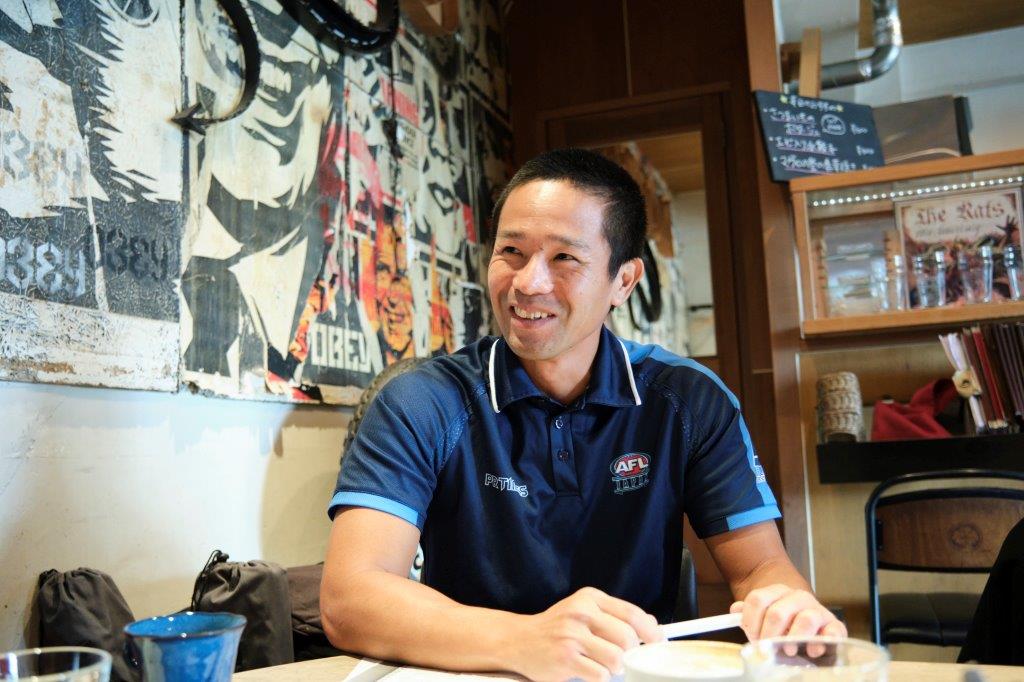
Q: When you had away games in Australia, did you have any issues with English?
A: I had plenty of issues! Ever since High School I didn’t do very well with English. I could understand what was being said but found it hard to express myself. That said, I could get by with shopping around town, and people would stop to talk to me because I was walking around wearing an AFL uniform. So, I gradually gained confidence. There were even times in Melbourne where people would say Konnichi wa to me, which was awesome.
Participating in a camp for people aiming to become professional AFL players
Q: After graduating from Waseda University, you went from playing in your university team to starting at an AFL team Down Under. Can you tell me what led up to this?
A: First of all, I started university in 2002, which was the year that the AFL International Cup was held for the first time. The Cup was held to encourage uptake of the sport outside of Australia, and I was selected for the Japanese national team, the Samurais.
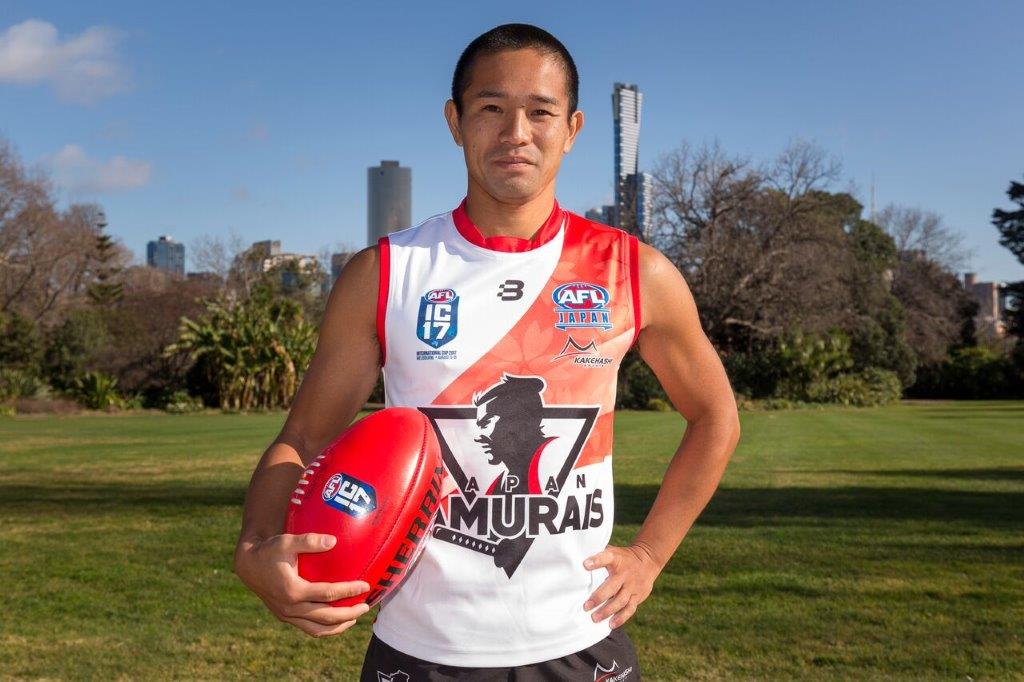
Michito during his time on the Samurais
The International Cup was held once every three years. The timing for that coincided with my fourth year at university, so I went to Australia to play. It was then that I was invited to attend a training camp at the Australian Institute of Sport (AIS) for players who were aiming to go pro. It was such a great opportunity, so I and another older teammate decided to participate.
The camp was directed at kids who had just graduated from High School and who wanted to go pro, so us foreign participants were a bit older than the rest. We were thrown into this environment of a high school sports camp where we really didn’t understand the English flying about the place.
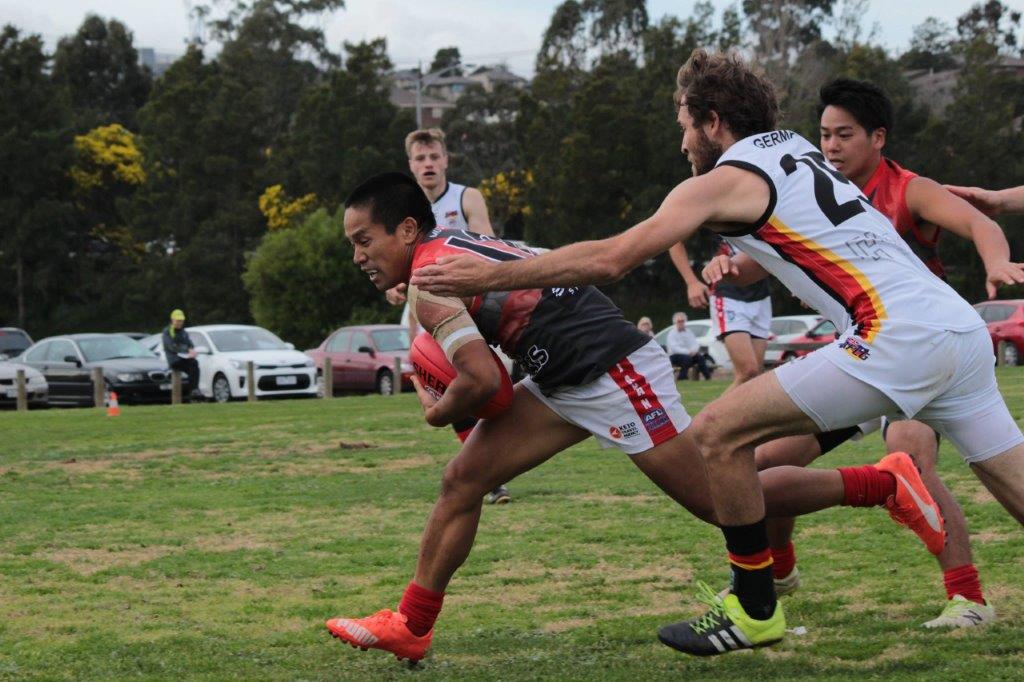
Michito scrapping with players with much bigger builds than him
The camp included lectures in a classroom as well as media training. They recorded us doing practice interviews in English. I wasn’t that good at English, so the local kids had a good laugh at my expense. But that gave me an opportunity to learn about Australia’s unique sense of humour and how they rib one another.

Q: Having locals tap you on the shoulder must have meant that you were a central part of the Japanese national team, right?
A: During my first year at university, I didn’t get any match time whatsoever. But from my second year, I became a regular starter and then got into the national team. While the national team might not have been that strong, I was selected at Best on Ground (BOG), which is something akin to Most Valuable Player (MVP). At the time, I was playing in the position of Rover, which is near the midfield. During the fourth year, I went to an Essendon Bombers camp, which was a great thing to do. It was such a valuable experience to train alongside actual AFL players in a first-class environment.
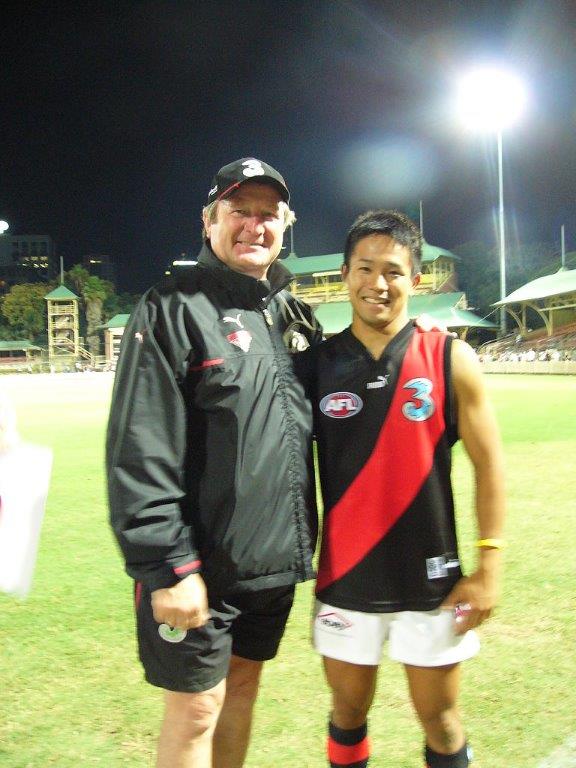
At the pre-season camp for the Essendon Bombers
Deciding to play in a regional independent league
Q: After the camp, you entered a team that was part of an independent league, right?
A: Of course, I’d hoped to be signed up with an AFL team, but it wasn’t to be. So, I decided to go down the path of playing in a regional independent league. I felt like playing serious footy in Australia, so decided to stay. It was such a popular sport in Australia, and I felt strongly that I wanted to prove that a Japanese person could cut it.
In total, I spent two years playing in Australia. My first season was at a team called the Wodonga Raiders. When I say I had a contract with them, it was just the coach directly talking to me about how much I’d get paid per match. If we were relegated to its feeder team, we wouldn’t get paid. That was quite tough.

A picture from when Michito played in the Wodonga Raiders
It was an independent league centred on the area around the Victoria-NSW border. I of course knew this going in, but we played in places that were even more rural than I’d imagined. At that time, there were only two or three Asian-Australian households in Wodonga, so Japanese people were a curiosity there.
Q: Do you have any memories of that time you’d like to share?
A: I realised that without advocating for yourself, you wouldn’t be able to forge a path forward. I didn’t have any proper accommodation, so they told me to homestay at a teammate's home. But that can only work for so long. The teammate I home stayed with was around my age, so we naturally strained ourselves not to get in each other’s way.
I decided to look for my own room, but it was really hard to find someone who would rent to a foreigner. I got help from a teammate and finally found a place to stay. They also helped me find a few jobs. Even though they weren’t hiring, I asked the local high school if they needed a Japanese language assistant, and the very next day, they had arranged a seat for me in the teacher’s room. Things moved ahead quickly, and I was greatly helped by the kindness of those around me who wanted to help this Japanese guy in need.

Q: How did you spend your days during that period?
A: Because of my visa, I couldn’t get paid a salary. Nevertheless, I worked as a Japanese language assistant at the school from morning until the afternoon. I’d get up early to train, then go to school, before going back for more training or going to team practice, which was on Tuesdays and Thursdays. Every other day, I’d train by myself. I’d get up every day at 5am to go to the gym and work up a sweat. I loved getting into the jacuzzi after that! Everyone must have been thinking about how much Japanese people like bathing!
Another memory I have from that time is the club dinners we’d have every Thursday. For just ten dollars, you’d be able to gorge yourself on a luxurious buffet at the clubhouse. It was a chance to chat with your teammates and get to know them better. I always cooked for myself there, so it felt even more delicious to be able to eat food prepared by someone else.
But during my time there in the 2006 season, the Wodonga Raiders had a pretty bad season, and the coach got quite a drubbing. When we were doing badly, the fans could be quite cold, so it was a difficult time. Plus, I experienced one problem unique to regional independent leagues – travelling to matches. It was not unusual to travel 80km one way to attend a match, and people would drive themselves. I got more and more nervous as I was threading my way through mountain roads with no one around. I guess that is what happens in a country as large as Australia.
Joining a metropolitan team near Melbourne for the 2nd season
Q: I hear you played for a different team in 2007. Is that right?
A: Yes, during my second season, I left the Wodonga Raiders and went to the Heatherton Football Club, which is part of the Southern Football League. It was a completely different environment, being a metropolitan team on the outskirts of Melbourne.
There was a reason why I chose to play for a metropolitan team – because it was close to AFL headquarters. At the time, I was in touch with AFL headquarters a lot. I got some training and became qualified as an umpire and a coach. Of course, I did this while also continuing to play with my team.
At that time, I also taught footy to Japanese players and translated the official rules into Japanese. The next year, I returned to Japan and began seriously trying to spread the word about AFL across Japan. I guess I’d started preparing for this little-by-little at the time.

Q: What did you do on your days off during this period?
A: I went for drives. Compared to Japan, Australian cities are quite compact, so you only have to drive a short distance to get out into nature. The scale of the landscape is vast, so it was very refreshing. I don’t drink alcohol, but friends would take me to wineries – I remember the food being delicious. This particular winery had an olive grove as well, making for a very sophisticated atmosphere. This was when I was living on the outskirts of Melbourne.
Around 2007, prices in Australia were still quite a bit lower than now, and food was also cheaper than in Japan. If I didn’t splurge, I was able to live quite comfortably. My income was quite low even in my second season playing in Australia, so the low prices were a big help. Prices are now much higher, so things are quite different to when I was there.
Setting up AFL Japan after returning home
Q: When you returned in 2008, you started spreading the word about AFL in Japan, right?
A: At that time, there was a voluntary organisation called the Australian Football Association, but it wasn’t yet incorporated. So, I and another player who had just returned from Australia decided to formally register the organisation with the unofficial title AFL Japan.
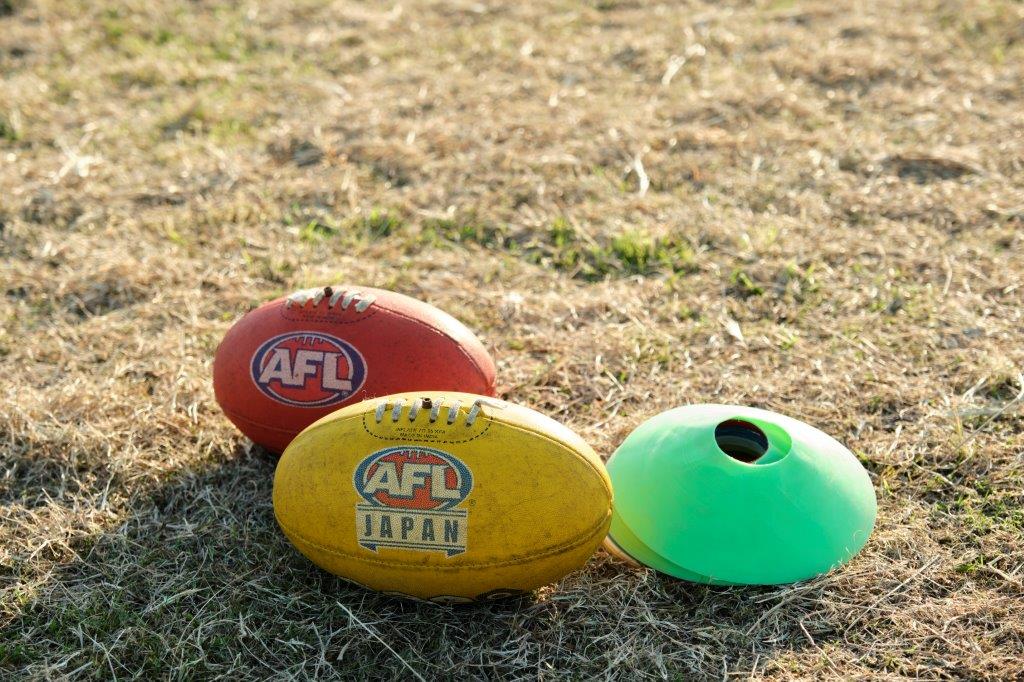
Before that, I set about translating the entire AFL rulebook into Japanese and drafted the official rules of AFL Japan. I also put a lot of effort into umpire training, basic tactical training and other ways to spread understanding about AFL.
In 2009, the Essendon Bombers AFL team invited me to a training program about spreading knowledge of the game. Then, in 2010, I started giving regular AFL training sessions aimed at kids at a local sports club. It was around this time that I started teaching AFL in earnest. I went to school and community sport events to publicise this new game. I even made a website to spread the word further.
At the time, I was also continuing to play the game and was involved with running the domestic league. I also developed an education program aimed at schools with the help of an Australian contact.
A welcoming environment for both boys and girls
Q: I hear you are still running regular AFL classes. Can you tell me more about that?
A: We now have a kid's team, which has training once a week on the banks of the Tama River. We mainly target primary school aged kids with the goal of having them get to know how fun sport is by introducing them to AFL. We currently have about ten kids coming weekly, ranging from Year 1 kids up to Year 6 kids.
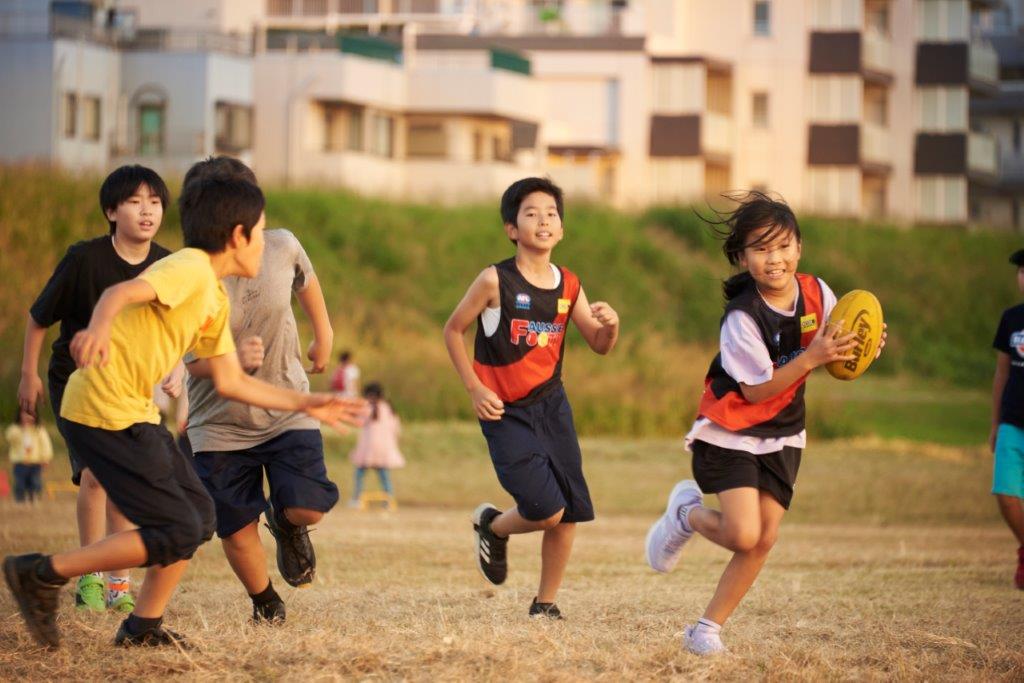
Q: AFL is becoming more popular with women. There is even a national women’s team, the Mirais, who have received support from the Australia-Japan Foundation. Do a lot of women play the sport in Australia too?
A: AFL in Australia has had a professional women’s league since 2017, which means they are about to enter their eighth season. When I was doing umpire training in 2007, my final test was at a women’s league match.
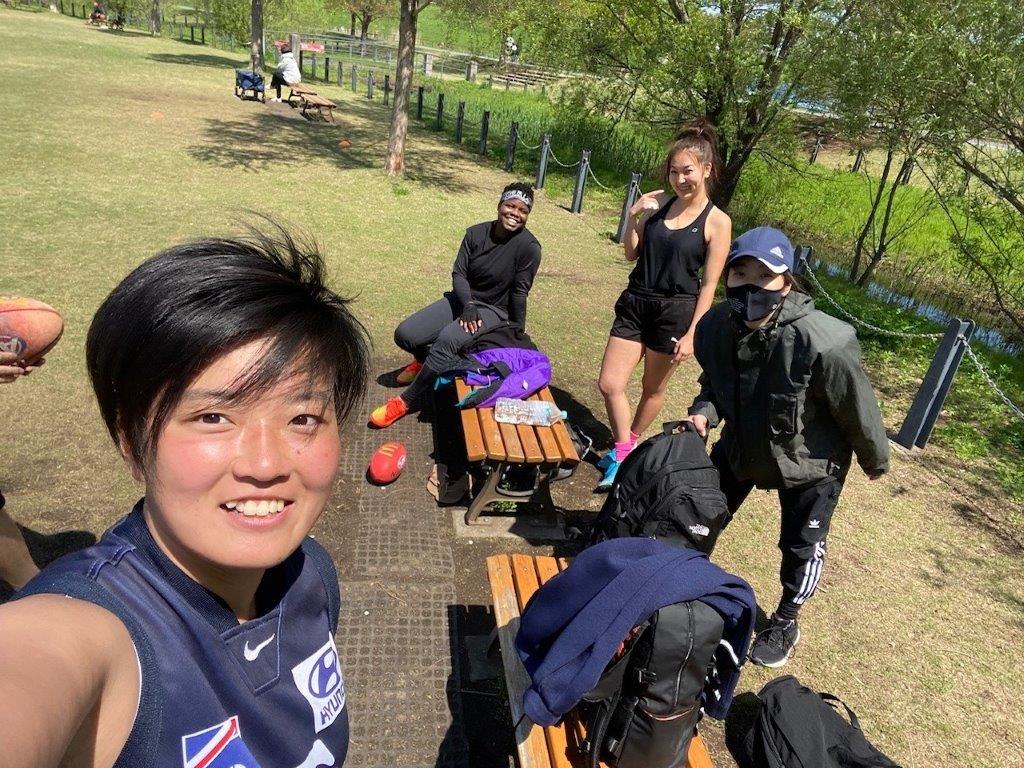
Members of the national women’s team, the Mirais
AFL fans are basically 50-50 men and women. The fan base is also of all ages. The game’s wide appeal is something that the AFL management is keenly aware of. You often see three generations of the same family coming to matches. I think that is part of why Australians love it so much. You see some grannies and grandads out there cheering their hearts out!
In a team of 18, there is a role for everyone
Q: Could you share with us what draws you to AFL?
A: I think I’ve said this before, but I love how much freedom there is in how the game is played and how quickly matches unfold. There are so many options when it comes to offence and defence. You can run, you can handpass the ball to another player, or you can kick it. And because there is no offside, you can go wherever you want. The game play is pacy, meaning you never get tired of watching a match. I also like how simple and easy to understand the rules are.
If you understand the rules, it is even more fun to watch. It’s also great that people of all shapes and sizes can get involved depending on the position played – in the team of 18, there are larger-framed players with power, and there are those with slighter builds who rely on speed. Games may look rough-and-ready, but actually it’s interesting to see how much planning goes into it, based upon quite close analysis of data. Every team has a data analysis unit which provides quite detailed advice. I guess this is the Australian character.
While there are so many aspects of the sport that would make it popular here, you do need quite a large number of players (18-a-side) and quite a large oval to play on. That is something of a hurdle. But you don’t need to speak English to enjoy watching matches from Australia. Actually, here in Japan, we often play on rugby ovals with rules made for 9-a-side games.
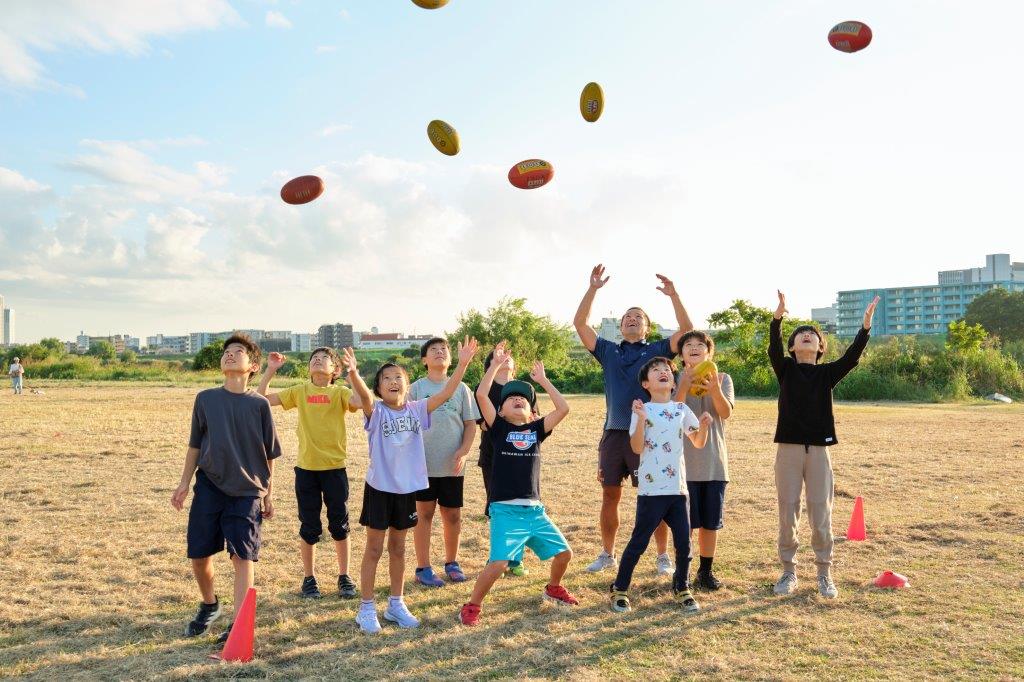
Q: As a player, and just in general, what are your impressions of Australian people and their culture, having had so much to do with the country?
A: What I felt when I was playing in local teams was that the Australian way of thinking is thoroughly logical. At training, each and every team member is properly managed and you keep going until the point where you almost drop. Even though it’s really hard work, you never get to the point of wanting to quit.
This may be due to not just coaching skills but also the coaching mindset. In Japan, a coach would train athletes until they start feeling ragged so that they get a sense of achievement out of fatigue. But, in Australia, you get results even without having to train to such an extent. Australians look at data from each and every player before telling that individual athlete what their particular goal is for that day. The same goes for matches, where they will look closely at how tired each player is and make a decision to swap them out early. I learnt a lot from this about how a coach should manage a team.
In Japan, professional athletes are treated as some kind of superhuman. But, in Australia, it’s quite the opposite – they tend to stress that they are just like every other regular person. I see AFL players on weekends at cafes just chatting to fans normally.
In Japan, there is still a sense that sport lauds the ‘aesthetic of suffering.’ But in Australia, they know how to naturally encourage athletes to develop. The job of a coach is to work out how to avoid putting undue pressure on your players but have them develop without the individual even realising it. That sort of management skill is something that is very highly praised in coaches in Australia.
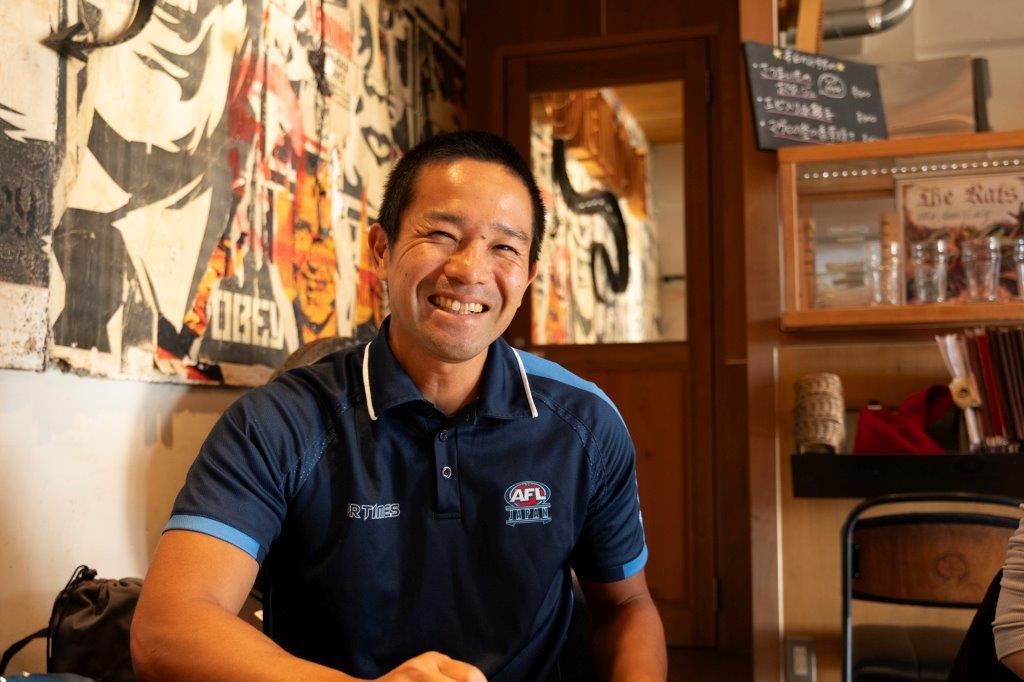
Q: How interesting. Are there any other differences between Australian and Japanese pro sports?
A: This example is from AFL, but in Australia, there are not only sponsors of teams, but individual athletes can also have sponsors. For players, being able to have these connections outside of the team is great for their own personal future. It raises your awareness of your life outside of sport and I think it has a positive effect in terms of educating players.
It would be hard to imagine a professional athlete who is playing in a team sport having an individual sponsor here in Japan. It is thought that focusing on the team is best, which means that there are few opportunities to learn skills useful in the outside world. Maybe this wouldn’t sit well with Japanese culture, but the atmosphere would change a lot if individual athletes could get sponsorship.
Another small thing is that I loved that there were always opportunities to go for a drink after club practice. You can go if you want and leave when you want. Of course, family comes first. That sort of culture is deeply rooted there and poses no problems. You’re welcome to participate, but no one minds if you don’t come along. This way of doing things sat really well with me personally.
I guess this is about a basic difference in values. Japan is, in a good way, a village-based culture where it is seen as a virtue if everyone operates based upon the same way of thinking within a group. But in Australia, the culture respects the individual, and it’s seen as a strength if players have different opinions within the group. In other words, it’s about diversity. I think that is the strength behind AFL and also what makes it so interesting.
Living life as an AFL player in Australia made me feel like a pioneer
Q: You often speak about tackling adversity as part of your training courses. Was there some sort of adversity you were able to face up to because of the fact you were living in Australia?
A: I guess I felt like something of a pioneer during my time living as an AFL player in Australia. If I made a move, there would be a reaction, and cogs would start to turn. Of course, I didn’t get everything I wanted, but if you don’t put yourself out there, nothing happens.
I went to that pre-season camp for the AFL team before going on to play in a local independent league. But all this was the result of having tackled adversity a whole number of times from when I was in Japan. To realise big dreams, you have to take a lot of small steps on a daily basis. That’s what I speak about in my classes.

Q: As an AFL player and also a person trying to increase awareness of the sport, what dreams and goals have you set for your own future?
A: Now that COVID is behind us and there are more people going back and forth from Australia, I want to devote myself to spreading the word about AFL across Japan. My big dream is to have the Japanese team win the International Cup. I’ve heard that the reason the AFL began running the international competition is because they wanted to see what would happen if people from other countries started playing and what sort of tactics they would come up with. I hope to be able to show them through how our teams operate that “this is how Japanese people play.”
I am now of an age that makes it tough for me to continue as a regular on the field, so I hope to put more of my energy into developing other players’ skills. My goal is to have one of the players that I’ve trained here in Japan go on to debut in the AFL itself. In recent years, there have been plenty of Japanese athletes playing around the world in soccer and basketball, so I’d like to see the same for AFL.
I also hope to create a space where you can enjoy the atmosphere of Australia right here in Japan. I’d like to construct an oval for AFL Japan as a way to bring together a wide range of people who have an interest in Australia. If possible, I’d like that to extend beyond sport to cultural exchange as well. It’d be great if that could become a place to convey information about Australia, including through building a cinema or a library. That is probably a long way off, but I’d like to make it happen one day.
